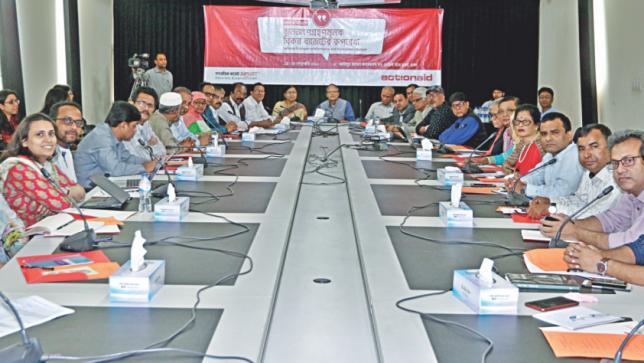Commission needed to remove barriers to budget execution

The government should form a central financial commission which will remove barriers standing in the way of budget implementation and make the budget participatory, analysts said yesterday.
“The financial commission will address the budget implementation challenges,” said Atiur Rahman, a former governor of the central bank.
MM Akash, a professor of the economics department at the University of Dhaka, echoed Rahman, saying a financial commission should be formed to bring transparency in revenue collection at district-level.
They were speaking at a “National Dialogue on Alternative and Participatory Budget” organised by Democratic Budget Movement, a platform that raises issues of public concern, at The Daily Star Centre in Dhaka.
Rahman said every person pays tax either directly or indirectly but there is no estimate on how much revenue comes through the indirect tax system.
The financial commission will develop a tax structure, identify areas to impose tax and find out how much revenue is earned from indirect tax, he said. The economist said people pay tax but the quality of public services was not improving. “Attention has to be paid to citizen's satisfaction in the budget,” he said.
“Extremely centralised budget is a problem,” said Prof Akash.
He said a decentralised budget requires segments focusing on districts. Prof Akash called for a pilot project to identify the problems of a decentralised budget.
Rasheda K Choudhury, former adviser to a caretaker government, said members of school managing committees were selected on political consideration, resulting in the committees acting in their own interest.
She said there was a lack of cooperation in preparing district-wise budgets. “Formation of a financial commission can prevent discrimination in budgetary allocation for districts by way of improving coordination.”
Speakers at the event also raised the issue of political biasness in allocation of district budgets.
Some districts are getting a lot of allocation while others deprived owing to political views in the budgetary allocation, said Khondaker Golam Moazzem, research director of the Centre for Policy Dialogue.
He said political leaders secure higher allocations for their home districts and neglect others, deepening discrimination and hampering equal development.
M Zakir Hossain Khan, head of climate finance governance at Transparency International Bangladesh, said Barguna has been demanding climate budget for a long time because it is an area highly prone to climate change-induced risks, but the district has not received the allocation.
On the other hand, Trishal upazila in Mymensingh district received a climate risk project although it is not among the regions that face climate risk, he said.
The right district is not getting the right allocation only because of political viewpoints of political leaders, according to Khan.
The budgetary allocation is enough for the health sector but the problem lies in release of the fund, said Rashid-E-Mahbub, convener of the Shastho Odhikar Andolon.
He said earnings of the health sector go to the government coffer, so if some power was given to government-run health centres, services would improve.
Monower Mostafa, executive member of Democratic Budget Movement, presented a concept paper on alternative and participatory budget.
